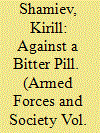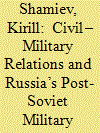|
|
|
Sort Order |
|
|
|
Items / Page
|
|
|
|
|
|
|
| Srl | Item |
| 1 |
ID:
178247


|
|
|
|
|
| Summary/Abstract |
From 2007 to 2012, Russian armed forces faced unprecedented changes that affected their structural, economic, social, and ideological elements. However, not all aims were fulfilled, and some changes were rolled back, despite the political and financial support from Vladimir Putin and Dmitry Medvedev for the defense minister Anatoly Serdyukov. Using the data from 11 interviews with former high-ranking military officers, scholars, and insider press workers, the research shows that the unsustainability of the reform was caused by the radicality of changes, the interest groups influence, and the technocratic policymaking in nondemocratic Russia. In addition, the research demonstrates the strategies the reformers used in order to overcome the resistance from mobilized interest groups. They had not succeeded, that ultimately led to the resignation of the defense minister, which stopped further radical changes in the contemporary Russian armed forces.
|
|
|
|
|
|
|
|
|
|
|
|
|
|
|
|
| 2 |
ID:
189920


|
|
|
|
|
| Summary/Abstract |
This article studies the role of military culture in defense policymaking. It focuses on Russia’s post-Soviet civil–military relations and military reform attempts. After the fall of the Soviet Union, Russia’s armed forces were in a state of despair. Despite having relative institutional autonomy, the military neither made itself more effective before minister Serdyukov nor tried to overthrow the government. The paper uses the advocacy coalition framework’s belief system approach to analyze data from military memoirs, parliamentary speeches, and 15 interviews. The research shows that the military’s support for institutional autonomy, combined with its elites’ self-serving bias, critically contributed to what I term an “imperfect equilibrium” in Russian civil–military relations: the military could not reform itself and fought back against radical, though necessary, changes imposed by civilian leadership.
|
|
|
|
|
|
|
|
|
|
|
|
|
|
|
|
|
|
|
|
|